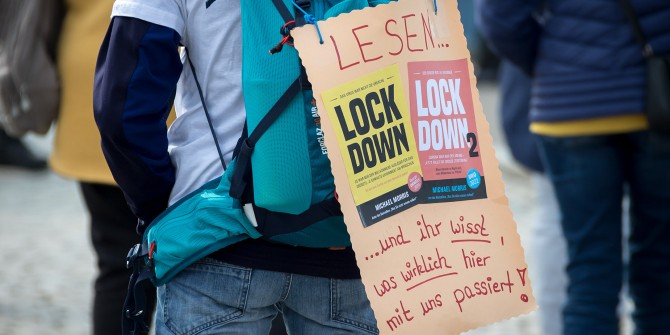The German anti-lockdown Querdenken movement, which has now pivoted to an anti-vaccination stance, was highly strategic in where and how it mobilised protestors. While it failed to have a significant influence on the German election, say Katharina Pfaff (Vienna University of Economics and Business), Eric Neumayer (LSE) and Thomas Plümper (Vienna University of Economics and Business), the organisers are likely to exploit future opportunities for anti-establishment protest.
The lockdowns and social distancing implemented to keep the pandemic under control have huge distributive effects. Not surprisingly, this has generated protest against these policies all over the world. In liberal democracies, this is simply part of the normal political process.
Protest organisers choose the timing and location of protest events to maximise the number of attendees at protest events – a requirement to generate media coverage which enables the movement to subsequently stage yet more successful protest events attracting media attention. Anti-lockdown protests were generally more frequent when and where these policies were relatively stringent and mortality rates were relatively low. The organisers find it easier to mobilise people when containment measures are considered disproportionate in relation to the health risk.
But there is more to anti-lockdown protests than this epidemiological logic suggests. As our paper shows, in Germany the timing and location of protest also follows a strategic political logic. Not all districts have the same potential for mobilisation against COVID lockdowns. Protest organisers from the so-called Querdenken (‘Thinking Outside the Box’) movement, the dominant force behind protests, did not only locate events at times and in districts that had relatively stringent containment policies and relatively low mortality rates. They also chose areas where support for the mainstream parties that support containment policies is low – the conservative CDU/CSU, the Social Democrats, the Greens and, to some extent, the Free Democrats, though this party has been somewhat lukewarm in its backing.
The Querdenken movement has evolved from a local initiative into the most high-profile movement against lockdown policies in Germany
Put differently, many protest events take place where the two political parties outside the political mainstream on the right and the left end of the political spectrum – the Alternative für Deutschland and Die Linke – have their political strongholds. The protest movement thrives where the level of political trust in the democratic system of Germany in general, and in mainstream parties that support the political order and lockdown policies, is low. Organisers can mobilise those who oppose the German political mainstream and the political elite more easily. Distrust in the political system and in the necessity or appropriateness of lockdowns reinforce each other.
These events have failed to influence the Merkel government: Germany maintains relatively stringent containment policies and is only cautiously and slowly returning to normal. However, the interplay between relatively stringent lockdowns and the opportunistic strategies of protest organisers generated a momentum that helps the leaders of the protest movement to institutionalise anti-lockdown and anti-vaccination sentiment. The Querdenken movement has evolved from a local initiative into the most high-profile movement against lockdown policies in Germany. After the first Querdenken‑711 group was formed in Stuttgart, regional Querdenken offshoots sprang up all across Germany.

Whether the Querdenken franchise survives the end of the pandemic is an open question. At the moment Querdenken mobilises predominantly against the vaccine campaign. It clearly failed to make opposition to lockdowns the main agenda item for the 2021 elections to the Federal Parliament on 26 September. The recent removal of user accounts, pages, and groups linked to the Querdenken movement by Facebook and Instagram on the basis that they spread misinformation is unlikely to affect mobilisation in the long run. Communication with peers and supporters can still take place via social media.
However, as Querdenken‘s agenda is deemed to go beyond simple anti-lockdown protests, the Federal German intelligence agency has now joined several state agencies in formally carrying out surveillance of activists and parts of the movement since April 2021. If their suspicion that these groups work to undermine Germany’s democratic foundations is borne out, it may lead to a ban on the group. More likely is that the pandemic as we know it will end, COVID will become endemic and Germany will eventually follow the UK and lift all national lockdown measures. If and when that happens, Querdenken is likely to disappear from the landscape, but the distrust in political institutions will continue. Anti-establishment protest will choose a different theme and the organisation will probably change its name and main focus.
This post represents the views of the authors and not those of the COVID-19 blog, nor LSE.





